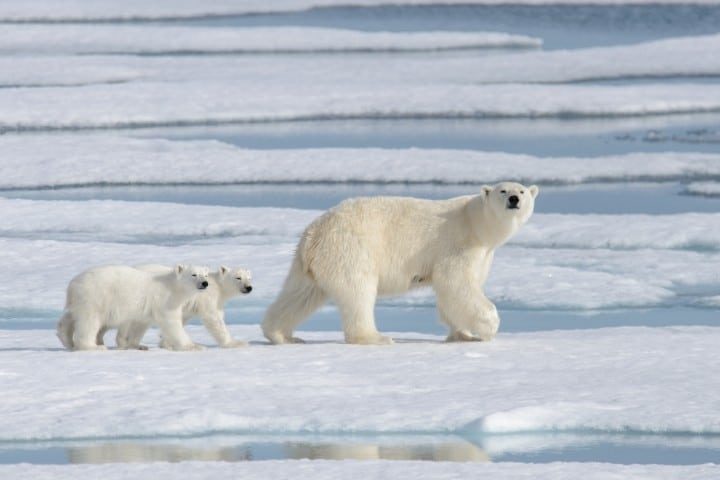
Just in time for International Polar Bear Day — yes, that’s a thing — came some good news for the hypercarnivorous Arctic-dwelling species. Canadian zoologist Susan Crockford has published a new State of the Polar Bear Report for 2020, in which she concludes that the bears’ allegedly dire situation is improving despite climate-alarmist concerns that the animal is almost assured of going extinct due to the scourge of anthropogenic global warming.
For years now, climate alarmists have been using images of polar bears supposedly “stranded” on ice floes as evidence that global warming — now stylized as climate change, or climate emergency —- is destroying the habitat of the apex predators, thus putting the species at risk of extinction. Polar bears are sometimes referred to as the “canary in the coal mine” when it comes to climate change. In other words, stressed populations of polar bears equals a stressed climate.
But according to Crockford’s report, polar bears, at least currently, are not so stressed. Global populations for polar bears appear to be on the rise.
In fact, 2020 seems to have been a banner year for the species, despite 2020 having the second-lowest September ice extent since 1979. “This indicates summer sea-ice levels are not as critical to polar bear survival as USGS (United States Geological Survey) biologists assumed,” Crockford states in the report.
Despite the low level of summer ice in 2020, Crockford notes, “there were no reports from anywhere around the Arctic that would suggest polar bears were suffering as a result; no starving bears, no drowning bears, and no marked increases in bear conflicts with humans.”
Such reports suggest that summer ice — which was supposed to be gone by now according to Al Gore and climate scientists — may not be as important to polar bear survival as many researchers believe. “Indeed, contrary to expectations, several studies have shown that polar bears in many regions have been doing better with less summer ice, either because multi-year ice has been replaced with more productive seasonal ice, or because the increased primary productivity that has come with longer open-water seasons has been a net benefit,” Crockford writes.
Instead of being endangered, the global polar bear population appears to be growing or stable among most of the subpopulations of the species.
“Included in the evidence are survey results for 8 of the 19 polar bear subpopulations, only two of which showed insignificant declines after very modest ice loss. The rest were either stable or increasing, and despite some major reductions in sea ice. As a result, the global population size is now almost 30,000 — up from about 26,000 in 2015,” says a press release from the Global Warming Policy Foundation, which published Crockford’s report.
According to Crockford, those numbers may actually be on the low side when it comes to estimating polar bear population, which she says “may arguably be as high as 39,000.” When it comes to a hypercarnivorous bear that sometimes comes into contact with humans in the far north, that population seems high enough.
Crockford has long been a controversial figure in the world of polar bear study. In 2019, she was let go from her teaching job at the University of Victoria, allegedly over her research that appears to debunk the claims of climate alarmists that polar bears are endangered.
You may recall that Crockford was also a key figure in Facebook’s decision to censor conservative media company PragerU in May of 2020 for “repeated sharing of false news,” which was connected to a video that Crockford made claiming that, despite hysterical predictions by climate alarmists, not all polar bear populations were stressed due to climate change — and that, in fact, many of those populations were thriving.
But then, and now, Dr. Crockford, a scientist, is giving her opinion on what is happening with polar bears based on data that she has interpreted. Crockford has sufficient scientific bona fides on the subject of polar bears to comment on the issue. She is an evolutionary biologist who has worked in the fields of archaeo-zoology, paleozoology, and forensic zoology for forty years. She has studied polar bears for decades and has written books on the subject. She is a person with a learned opinion on the subject of polar bears — someone who should be listened to, even if not necessarily agreed with, when talking about how the species is surviving.
That’s how science is supposed to work.



